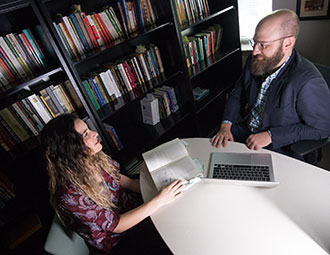Most universities claim that student success is their top priority. But few are going to the lengths FGCU has to prove it.
In Fall 2018, FGCU’s Lucas Center for Faculty Development launched the Student Faculty Partnership Program (SFPP). This unique initiative pairs faculty members with undergraduate students who act as “pedagogical consultants,” analyzing, affirming, observing and helping to revise the teaching approaches employed in particular courses. Led by Lucas Center Director Bill Reynolds, Ph.D., along with co-leaders Lucas Center Assistant Director Jackie Greene, Ed.D., and Dean of Students Michele Yovanovich, Ed.D., the SFPP is one of just a handful of such programs in place in the country.
“Students learn a lot about the engine of teaching and of the university, helping them become better informed consumers of their education. They become more connected to the process. Their communication skills improve. And their self-confidence strengthens,” Reynolds says. “And the faculty partner benefits by reflecting deeply on their approach and on habits they might have formed over the years, seeing them through the eyes of the student. It’s not often that people observe your teaching from the outside. But faculty partners are willing to risk that criticism to raise their games.”
The idea was modeled after the Bryn Mawr Students as Learners and Teachers (SaLT) program, with over a decade of proven success in developing strong student-teacher partnerships resulting in faculty development. FGCU’s program goes beyond the Bryn Mawr model to be more collaborative and reciprocal in its format, benefiting both partners and helping them grow. The premise of the semester-long program is simple:
- Pair a teacher and student consultant for a semester as equal colleagues.
- Have the student audit the class, observing student engagement and other aspects of faculty-student interaction relevant to each faculty member’s professional challenges. Students might go further to interview class members about particular issues. But they do not take the class — they just observe the students and faculty member.
- Meet weekly to discuss the observations and brainstorm on ways to correct issues.
In the first semester of the program, there were eight student-faculty pairs. That number doubled for spring 2019. Students receive compensation for the time they spend on the initiative. And new faculty members are offered first pick at available spots in the program. So far, there has been no shortage of volunteers.
“The SFPP is growing into one of the premier programs at the Lucas Center for Faculty Development. We were thrilled with the results of our first semester of offering it. The participants were extremely committed, not just to each other, but also to the university. They have a service-oriented mindset that reaches beyond their own self benefit,” observes Reynolds. The Lucas Center also runs FGCU’s New Faculty Academy where new professors are mentored in the FGCU “way” of teaching. Together, these two programs comprise one of the most comprehensive New Faculty Development Programs in the nation.

One of the service-based reciprocal partnerships of the SFPP’s charter semester was forged between senior biology major Angela Gennocro and Assistant Professor of African History John (Trey) Straussberger, Ph.D.
Gennocro’s eventual goal is to teach biology, so getting an opportunity to peek behind the teaching curtain through this partnership was invaluable to her education. But she also gained a deeper appreciation for her professors in general. “Students don’t realize how much work professors put into their classes. It’s not like they prepare a lecture once and use it for 20 years. There’s a lot of work and re-work every semester. Seeing that firsthand made me realize they are investing a lot more in us than we know,” she says.
Of course, participating in a program like this can make for some uncomfortable conversations. “We’d be doing something wrong if it didn’t feel uncomfortable,” says Straussberger. In this relationship, he had to set aside his sensitivity when hearing critiques and Gennocro had to learn how to have difficult conversations, even in an equal relationship. However, “There was real change that came out of those conversations. They were very productive,” he says. “I learned to be more transparent and to explain to students why we are covering different topics. In fact, every day this program revealed tiny improvements, like making lecture notes available and dedicating time to review lessons with students. It destabilizes what you think about teaching so you can reflect on your performance and do a better job of connecting with your students. It’s a great program that continues to pay dividends after the partnership is complete.”
Although Gennocro worked with a different professor in the spring semester, her partnership with Straussberger persists. The two of them have been asked to collaborate on a chapter for a book being written about this program and its iterations at different colleges. This is a first opportunity for both of them to co-author a piece like this.
As the SFPP continues to mature, is collecting survey information and data to inform the program’s future. Preliminary results indicate that the professors develop a more heightened awareness of their impact on a classroom, gain a different perspective on their teaching practices and are engaging in more inclusive practices. The student participants experience a deeper sense of belonging on campus, feel affirmed in the contributions they make and are becoming more engaged in all their classes. As a second semester of data rolls in, the SFPP will have more hard data to hone the approach and prove the program’s impact.
Beyond supporting the university’s focus of making student success the No. 1 priority, the program also reflects The FGCU Effect, where one contribution creates an ongoing impact that reverberates through the university and the community. When students and professors connect honestly and constructively, everyone wins.